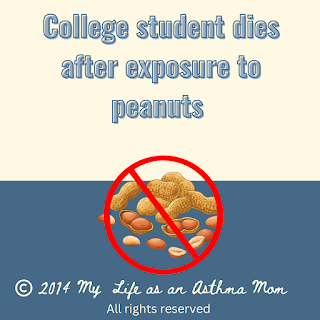College student dies after being exposed to peanuts
My sister sent a story she read in the Washington Post titled "College student dies after severe allergic reaction to peanut butter." It was so sad, I could hardly finish reading the article. Sometimes things hit a little too close to home.
Son #1 experienced a severe allergic reaction (anaphylaxis) several years ago. Son #2 has a tree nut allergy - not to be confused with a peanut allergy. (Peanuts are actually from the legume -or bean family - and they grown in the ground.) Tree nuts grow on....... well....trees! Son #2 is allergic to pecans, walnuts, almonds, etc. I am allergic to seafood. We all carry epi pens - EVERYWHERE!!!!
Apparently, the college student, Chandler Swink, had visited an apartment where someone had made peanut butter cookies. Somehow, he came into contact with the cookies or some of the peanut residue. He started to feel symptoms of anaphylaxis and went out to his car to use his Epi Pen.
The National Institutes of Health list these symptoms of anaphylaxis:
- Skin—itching, hives, redness, swelling
- Nose—sneezing, stuffy nose, runny nose
- Mouth—itching, swelling of the lips or tongue
- Throat—itching, tightness, difficulty swallowing, swelling of the back of the throat
- Chest—shortness of breath, cough, wheeze, chest pain, tightness
- Heart—weak pulse, passing out, shock
- Gastrointestinal (GI) tract—vomiting, diarrhea, cramps
- Nervous system—dizziness or fainting
Chandler then drove himself to the hospital. However, he was later found unconscious in the parking lot. He had suffered cardiac arrest and an asthma attack. He was taken off life support a week later. What a horrible thing for his family to have to experience. My heart hurts for them :(
The National Institutes of Health suggest:
If you or someone you know is having an
anaphylactic episode, health experts advise using an auto-injector, if
available, to inject epinephrine (a hormone that increases heart rate,
constricts the blood vessels, and opens the airways) into the thigh
muscle, and calling 9-1-1 if you are not in a hospital. If you are in a
hospital, summon a resuscitation team.
If epinephrine is not given promptly, rapid
decline and death could occur within 30 to 60 minutes. Epinephrine acts
immediately but does not last long in the body, so it may be necessary
to give repeat doses.
Unfortunately, Chandler drove himself to the hospital. Maybe he had used his Epi Pen before and then was treated at the hospital and survived? Maybe he thought it would be okay? Who knows.
I know I am going to have a reminder talk with my sons. Use the Epi Pen and then call 911.
My thoughts are with Chandler's family.

Wow what a sad story! That's why it's important for doctors to constantly remind their patients what to do in case of anaphylaxis. I've had anaphylaxis for allergy shots too and always have my Auvi-Q. My doctor gives me an allergy action plan to me every time I visit no matter how many times I have seen it. On another note, I think express scripts is finally covering auvi-q next year because it wasn't under the excluded drug list
ReplyDeleteYes! You can have anaphyaxis ANY time...you never know when it might hit.Scary stuff! I'm glad you are prepared.
DeleteAnd I hope your insurance will cover the Auvi-Q. It seems so much easier to use than an Epi Pen.
I was just indexing an obituary on family search and there was a senior missionary from utah who died of anaphylaxis which serving a mission. That was in 1994 but still, missions are risky for those with severe allergies, you're surrounded by people who don't know you well in an unfamiliar place.
ReplyDeleteYes, any time you travel you need to let people know if you have allergies to foods or something else.
DeleteAnd ASK QUESTIONS!!!
I have to ask people about what is in food dishes. If I am at a conference, party, etc, I ask what's in it. Usually my husband will check the food first if it looks suspicious.
It can take just one bite for me to end up in anaphylaxis
You can never be too careful :(